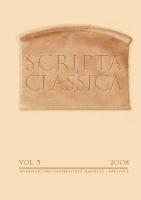O pojęciu "lepos"
About the term "lepos"
Author(s): Józef KorpantySubject(s): Language and Literature Studies
Published by: Wydawnictwo Uniwersytetu Śląskiego
Keywords: roman humour; theory of humour; affections; lepos; festivitas; facetiae; sal; affectus; ridiculum
Summary/Abstract: The noun "lepos" is an important Latin rhetorical notion. It exists on its own and can mean "grace, charm, magic, allure, wit, humour". Cicero enumerates numerous linguistic phenomena characterised by "charm" ("lepos") or "the power of expression" ("vis"). Often, "lepos" refers to the act of making a rethorical speech covering the voice use, mimics and gestures ("actio", "pronuntiatio"). In the legal trial, the accusations could be tendered or even invalidated by means of humour ("lepos") more effectively than by means of a flamous and pathos expression. Roman rhetoricians recommended the use of humour deprived of aggression and pathos, but were aware of the fact that the speech can lose the power of expression ("dignitas", "vis"). Cicero, and, subsequently, Quintilian, combined subtle humour with the knowledge of affectus and made use of it in the oratorical practice. Very often, "lepos" appeared in line with nouns such as "festivitas and facetiae". Such a pair of notions, as can be deduced from the analysis of contexts, entails a sophisticated humour. The article finishes with the analysis of a pair of notions of "lepos" and sal in Catullus' carmen 16.
Journal: Scripta Classica
- Issue Year: 2008
- Issue No: 5
- Page Range: 51-57
- Page Count: 7
- Language: Polish

